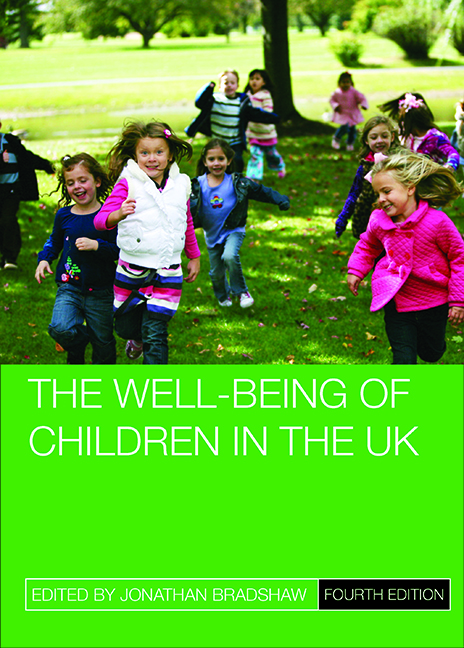Book contents
- Frontmatter
- Contents
- List of figures and tables
- List of abbreviations
- Notes on contributors
- Acknowledgements
- One Introduction
- Two Demography of childhood
- Three Child poverty and deprivation
- Four Physical health
- Five Subjective well-being and mental health
- Six Education
- Seven Housing and the environment for children
- Eight Children’s time and space
- Nine Children and young people in care and leaving care
- Ten Child maltreatment
- Eleven Childcare and early years
- Twelve Children, crime and correction
- Thirteen Conclusion
- Bibliography
- Index
Ten - Child maltreatment
Published online by Cambridge University Press: 01 September 2022
- Frontmatter
- Contents
- List of figures and tables
- List of abbreviations
- Notes on contributors
- Acknowledgements
- One Introduction
- Two Demography of childhood
- Three Child poverty and deprivation
- Four Physical health
- Five Subjective well-being and mental health
- Six Education
- Seven Housing and the environment for children
- Eight Children’s time and space
- Nine Children and young people in care and leaving care
- Ten Child maltreatment
- Eleven Childcare and early years
- Twelve Children, crime and correction
- Thirteen Conclusion
- Bibliography
- Index
Summary
Key statistics
• In March/July 2014 there were over 56,000 children on the child protection register/subject to a child protection plan in the UK*.
• There were 48 child homicides in the UK* in 2013-14.
• There were over 36,000 recorded sexual offences and 9,500 recorded offences of cruelty and neglect against children under the age of 18 in the UK* in 2013-14.
• The most recent self-report survey data (NSPCC) indicates lifetime retrospective rates of maltreatment and severe maltreatment by a parent or guardian of 25% and 15% respectively. Experience of neglect is more common than (in descending order) physical violence, emotional abuse and sexual abuse. Almost a quarter of children (24%) are exposed to domestic violence at some point in childhood.
• Many children also experience lifetime maltreatment by non-resident adults (13%), peer victimisation (63%), sibling victimisation (25%), intimate partner abuse (13%) and exposure to community violence (67%).
• Many children experience bullying at school, by siblings and online, and there is growing evidence of its negative short-term and long-term impacts.
Key trends
• Rates of child protection registration have risen substantially since 2010 in England (+20%), Wales (+17%) and Scotland (+14%), but have fallen in Northern Ireland (–20%).
• There is evidence of a long-term decline in violent death in infancy and middle childhood, while rates in adolescence have remained stable or possibly risen.
• Rates of recorded sexual offences against children have increased in all four countries since 2009-10.
• Rates of recorded offences of cruelty and neglect have increased since 2009-10 in England and Northern Ireland, have remained stable in Wales and have decreased in Scotland.
• There is some evidence of a decrease in self-reported experiences of physical abuse over the decade between 1999 and 2009
Key sources
• Child protection statistics for England, Wales, Scotland and Northern Ireland
• Crime statistics for England, Wales, Scotland and Northern Ireland
• Jütte et al (2015)
• Radford et al (2011)
• A range of other self-report surveys including Health Behaviour of School-aged Children (HBSC), Children's Worlds, EU Kids Online, Net Children Go Mobile, NSPCC Social Networking Survey, Ofcom Media Use and Attitudes Survey 2014
- Type
- Chapter
- Information
- The well-being of children in the UK (4th edition) , pp. 263 - 286Publisher: Bristol University PressPrint publication year: 2011



